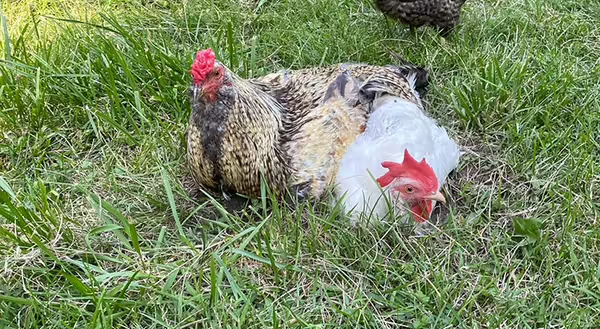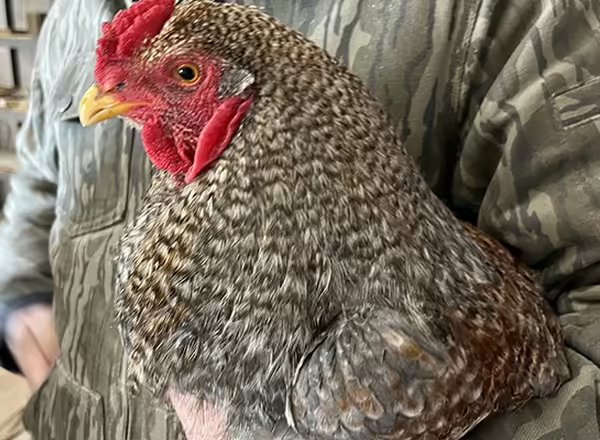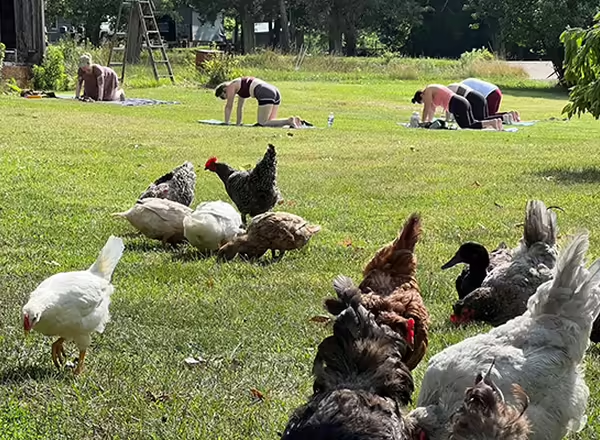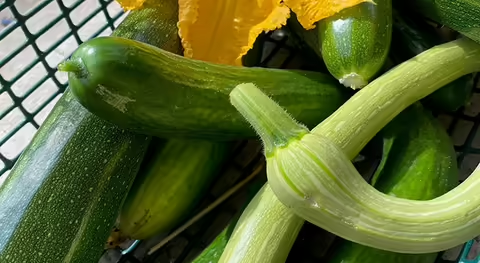
A cacophony of duck quacks, chicken clucks, and goose honks announced my arrival at the Little Farm at Weldon Springs, a quarter mile down the road from Weldon Springs State Park. Poultry Manager Anna Morell chased a basset hound named Roux around the yard while Rue tried in vain to catch one of the farm’s geese. Meanwhile, her husband, Produce Manager Chris Dunn-Rankin, worked in the woodshop, blissfully unaware of the chaos unfolding just outside. Five roosters in a chicken tractor pecked and scratched at grass near the main drive, enjoying their final hours on pasture before being culled from the flock. Rue’s antics had bought the roosters another 15 minutes of life – but the show was about to go on.
Life and death on the farm
Typical farm interviews usually do not begin with dispatching livestock – but this one did. Prior to new shipments of live poultry arriving at the farm, the rooster-to-hen ratio needed adjusting. Anna had invited me to observe the dispatch process so that she and Chris could answer questions while the birds were processed by hand. Time management at its finest. The compassion and respect that Anna showed her roosters in their final moments was breathtaking. Any bird not taken to the processor for commercial sale dies a quick death right where they were born, on-farm, by her hand. I could not help thinking that, if I were a chicken, this seemed much preferable to being shipped away to an unfamiliar processor…
Vegetable gardening opens doors
Chris and Anna began their life together growing vegetables in a rooftop garden plot of their Oak Park apartment. Chris – a music major in college – and Anna, a theatre major – shared an interest in the art of cooking. They were delighted by the deep, rich flavors that came from their vegetables when harvested and cooked the same day. From those first few bites of garden bounty onward, they knew that wherever they ended up, they wanted a large vegetable garden to provide more from-scratch, vegetable-centric meals.
The pair relocated to Champaign in 2016 for Chris’s work as a music teacher, growing what they could at a local rental and purchasing farm-fresh products at the Champaign and Urbana farmers markets. Five years later, they found their dream property in 2021, near Clinton, Ill., and purchased the 5.7-acre farm parcel with the intention of starting a farm venue-based business. However, vegetable mayhem – then chicken delight – would change all that.
Overabundance presents opportunity
“The first year on our dream property, we got to work and established a large, 50’ by 50’ garden plot. We planted cucumber, zucchini, eggplant, tomato, pepper, peas, beans, and pumpkins. Come harvest season, we loved every minute of fresh vegetable bounty – but we had more vegetables than we knew what to do with,” Chris told me.

Here come the poultry
Anna also threw an additional wrench into their ag-venue business plans by purchasing her first chicks from Meyer Hatchery. “As soon as the chicks arrived at our farm, I was hooked,” said Anna. Farm fresh eggs added a whole new dimension to their culinary adventures at home – and they had eggs to spare! Their vegetable and egg success pushed them to apply for their business license in February of 2022 – to find a good home for it all – and began selling vegetables and herbs at the Bloomington and Champaign Farmers Markets.
The “staying interested” philosophy
I wanted to know: did they mean for these other things to take over the business plan? The short answer was no, but the long answer was more interesting, and relatable! The Little Farm at Weldon Springs and its product line was born from “a philosophy of staying interested in things,” said Chris.
“We were really interested in cooking local food because it tasted better than grocery store food, so we grew some of our own. We loved that and were interested in doing more of it. We bought this property to do something else, but the staying interested philosophy led us to a many-fold increase in vegetables harvested – and surplus vegetables to spare, even after planning the weekly menu completely around what was available.”
“And for me,” Anna chimed in, “the same philosophy led to fulfilling my dream of tending poultry. Staying interested meant upgrading the chickens’ existence as coop and yard birds to pasture-raised birds. And at the same time, I was interested in adding other poultry species to the mix, so we got our first batch of ducks – which led to duck eggs – another product offering!” Geese soon followed, and then quail. Although the geese were acquired mainly for their loud, alarm-bell-like honking and flock protection from predators, they also lay occasional eggs.
I am always interested to learn how farmers became the farmers they are today. Sometimes, that means an internship, apprenticeship, being involuntarily trained to grow things in the gardens of parents as chore-work, or in other ways. Did Anna or Chris do anything like that to prepare them for their farming path, besides vegetable gardening? “Nope, none of those things, it was the School of Hard Knocks all the way,” said Anna. “Keeping vegetables alive and thriving is one thing, and Christopher does an amazing job, but learning how to work with the birds was hard – and it still is. I don’t care what animal you raise or plants you tend, farming is hard work – but so rewarding.”
Division of labor and diverse revenue streams create on-farm balance
How does the work get split up at the farm, I wondered? Who does what? “I am the Vegetable Manager, and Anna is the Poultry Manager,” said Chris. “Anna has a more livestock-oriented mind, and I manage our vegetables. We do pretty much stay in our lanes that way, with some exceptions. We help each other build things in the shop, or generally if something is much easier with two sets of hands, we collaborate.” However, there is another layer to their collaboration – and indeed another layer of balance in their lives – both mentally and financially.
Chris, as it turns out, held on to the music teaching job in Champaign that brought the couple to Central Illinois in the first place. He has a formal music teacher appointment and teaches private lessons in addition to his Vegetable Whisperer duties. Anna matches Chris in this way, working part-time as a Private Investigator…! It was enough to make my mind spin, visualizing what their weekly schedule must look like. “We’ve worked out a great system,” said Chris. “I’m vegetable-lead – I am the primary seeder, transplanter, harvester, and marketer, with a big caveat. When I go back to school in August, there are still two months left of market season, and Anna temporarily takes over most of that (giving up a lot of PI work to do so).”
Building farm skills builds confidence
The greatest success on the farm has been the transition from sedentary, yard-based management of the poultry to a rotational grazing system for them instead. “They’ve always had access to a large area to roam and peck and scratch, but rotating them on pasture reduces their parasite load, increases flock health, egg quality, bird lifespan, everything.” Anna’s proudest moment as Poultry Manager was this past year when she completed construction of three chicken tractors, which are now commonly used throughout the United States to rotate poultry daily onto new pastures. “The carpentry process involved was a bit of a beast, and there was a big learning curve, but I was so proud of myself when I was done!”
In our conversation, I suddenly saw a theme emerge. Farm sustainability for Chris and Anna seems to be achieved by diversifying not only their product offerings, but their income streams. The farm does not have to pay 100% of the bills, all because of the “staying interested” philosophy. Chris said he will likely never tire of teaching music. Anna, on the other hand, would like a change. “It is a long-term goal of mine to farm, full-time. I feel at home as a flock-tender and farm manager. There are a couple of things we need to do to make this a reality for me, but I think we are heading that way.”
Those couple of things seem to be taking shape. They are currently renovating an old outbuilding on the property adjacent to the farmhouse and are hoping to add a walk-in cooler, dance floor, bar area, event space, and ADA-accessible bathroom. So, it seemed that the farm-based event space business idea was not totally lost after all. Another income stream could come later this year from pasture-raised pork shares that Chris and Anna are thinking about offering. A pig purchase and electric fence setup is currently being discussed.
I wondered how they could add pork or venue-booking to their seemingly full plates, but Chris was more positive about it. “A benefit of a diverse farm is that each new venture takes pressure off the others. If something happens to one of them, it’s not as detrimental to the bottom line.”
Another question I had for them was did they feel like they were competing to a significant degree with other farmers’ market vendors in Bloomington or Champaign, when it comes to their product offerings, current and future. “At both places, and looking at vegetables and meat specifically, the farm product offerings are all very different. If you’re looking for the best buy per dollar, that’s one producer; most unique vegetable or meat product? That’s another. Both our markets have vegetables and meat and eggs available for the most part, but we can flex what we bring to either market, week by week, which results in a lot less competition than you would think.”
Asked if she would be willing to share the biggest challenge the farm has had to contend with, Anna answered. “We had a terrible thunderstorm come through last summer that led to a five-day power outage for the area. It was the middle of summer, so it was terribly hot with no air conditioning. We are also on a well, which means we needed electricity to pump water. Having no use of my sprinklers to tend the overheated livestock was especially demoralizing. But luckily it rained so much that I was able to collect just enough water for ourselves and the birds. The only good thing that came of that experience was it showed us how resilient we have become.”
Illinois Extension supports small farmers – but there is work to be done
Asked what Illinois Extension experiences or interactions they had had to this point, Chris shared, “I reached out to Extension for vegetable troubleshooting. We were having some weird nutrient issues with squash last summer that should not have happened. The feedback we got from the Master Gardener helpdesk was very helpful!” Asked what Illinois Extension could do for farmers like them that could have the most impact, Chris had more to share. “If there was such a thing as a mailing list to get on from your Local Food Systems and Small Farms Educator team, advertising your team’s programming, that would be excellent.” Anna had an insightful reply as well.
“Yeah, we are always looking for ways to be better farmers. We love The Land Connection – their farmer training resources are excellent, so anything Extension could offer in terms of direct farmer training is my vote. Another big frustration I’ve gone through was getting licensed to sell meat. At the state level, it is very clear what was required on my part, but then, across counties, rules can be different, and nobody seemed to have 100% of the county information. A county-by-county list of how to acquire ANY certification to sell – meat, eggs, dairy, etc. – would have saved me so much time. Develop a 'Farm Certifications and How to Acquire Them' county guide, please!”

Honesty is best policy in farm social media
I shared with Chris and Anna that I felt as though I had been to their farm many times before by watching near-daily farm updates that Anna posts to the farm's Instagram account. It is full of poultry drama, cat snuggles, and real, nitty-gritty farm existence. I wanted to know more about the inspiration behind that. “I think one of the things Anna does really well is showing the challenges of all this stuff in an accessible way; this work can be really daunting, but there are tons of joyful moments that come along with it.” Chris and Anna both think it is important that the small-farm lifestyle is not curated but presented honestly.
I asked Chris and Anna if they had any new, exciting directions in mind for the farm this year. “Besides the potential, to-be-determined pork share project, we did our food protection manager’s class, so we are thinking about adding dried herbs, teas, and maybe pizza dough to the mix! And/or potentially adding cut flower production. We’ll see where the season takes us!” said Chris.

Winter solstice musings and rooster cooking suggestions
Meditating upon the Winter Solstice season, I wanted to know how Anna and Chris recharge and prepare for yet another busy farming season. “I lean into cooking a lot – that’s where our relationship began, so it’s especially meaningful. We are both such big foodies, and it is energetically charging to just be able to sit and enjoy the food instead of shoving food in our faces and running off to the next thing,” Anna said. Chris replied that reconnection with Anna is especially important. “We see each other a lot during the year, but it’s generally within the context of work. So, in the slow times, we go on more dates, and enjoy some much-needed reconnection time.”
“So, what are you going to do with those rooster culls once they’re processed?” I asked. Anna was quick to respond. “They’ll be washed, then brined, dried, then vacuum sealed. We can’t sell them without an inspection exemption, which we have investigated but have not yet gotten, so we give them away to friends and family or make delicious dinners out of them.” Apparently, they are way too tough for fried chicken, but make excellent pulled chicken tacos after being braised. A special favorite dish made a few times a year on the farm is coq-au-vin – literally rooster in wine, in French. Suddenly quite hungry, I thanked the farmers for their time and left to make a big dinner.
